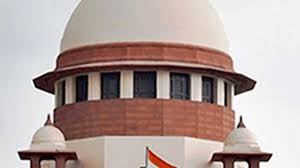Whether a person holding a driving licence in respect of a “light motor vehicle” could on the strength of the licence be entitled to drive a “transport vehicle of light motor vehicle class” having unladen weight not exceeding 7500 kgs. (Para 2)
A transport vehicle and omnibus, the gross vehicle weight of either of which does not exceed 7500 kg would be a light motor vehicle and also motor car or tractor or a roadroller, “unladen weight” of which does not exceed 7500 kg and holder of a driving licence to drive class of “light motor vehicle” as provided in Section 10(2)(d) is competent to drive a transport vehicle or omnibus, the gross vehicle weight of which does not exceed 7500 kg or a motor car or tractor or roadroller, the “unladen weight” of which does not exceed 7500 kg. That is to say, no separate endorsement on the licence is required to drive a transport vehicle of light motor vehicle class as enumerated above. A licence issued under Section 10(2) (d) continues to be valid after Amendment Act 54 of 1994 and 28-3-2001 in the form. (Para 3(60.2))
When the reference before the three-Judge Bench was taken up, counsel appearing on behalf of the insurance companies submitted that the judgment in Mukund Dewangan (supra) has not noticed certain provisions of the Motor Vehicles Act 1988[“Act”]. In particular, it was submitted that Section 3 stipulates that “no person shall so drive a transport vehicle other than the motor cab or motor cycle hired for his own use or rented under any scheme made under sub-section (2) of Section 75 unless his driving licence specifically entitles him so to do”. Apart from this, the referral order notes that the two-Judge Bench was also of the view that other provisions, including Sections 4(1), 7 and 14 of the Act and Rules 5 and 31 of the Central Motor Vehicles Rules 1989, were not noticed in Mukund Dewangan (supra). (Para 4)
The note also indicates that the letter dated 16 April 2018 was issued by the Union government taking note of the judgment in Mukund Dewangan (supra) as the law declared by this Court. Resultantly, the notification dated 31 March 2021 was issued to further amend the Rules to bring them in conformity with the judgment. However, the Attorney General has submitted that this may not be treated as a policy declaration by the Union Government and, as such, the letter and the notification may not have any bearing or conclusiveness on the state of law to be clarified. (Para 9)
We are of the considered view that it would be necessary for the Union Government to have a fresh look at the matter. We are inclined to take this view for the following reasons (Para 11)
The considerations which have been flagged above do not necessarily weigh in the same direction. However, all of them do raise important issues of policy which must be assessed and evaluated by the Union Government. Whether a change in the law is warranted is a matter which has to be determined by the Union Government after taking a considered decision bearing in mind the diverse considerations which fall within its remit in making policy choices and decisions. (Para 12)
Having regard to these features, we are of the view that the issue of interpretation which has been referred to the Constitution Bench by the referral order dated 8 March 2022 should await a careful evaluation of the policy considerations which may weigh with the Government in deciding as to whether the reversal of the decision as it obtains in Mukund Dewangan (supra) is warranted and, if so, the way forward that must be adopted bearing in mind the diverging interests, some of which have been noted in the earlier part of the order. (Para 13)
Hence, in view of the consequences which may arise by the reversal of the judgment in Mukund Dewangan (supra), it would be appropriate if the entire matter is evaluated by the Government before this Court embarks upon the interpretative exercise. Once the Court is apprised of the considered view of the Union Government, the proceedings before the Constitution Bench can be taken up. (Para 14)
SUPREME COURT OF INDIA
2023 STPL(Web) 293 SC
[2023 INSC 832]
M/S Bajaj Alliance General Insurance Co Ltd. Vs. Rambha Devi & Ors.
Civil Appeal No 841 of 2018 WITH SLP(C) No. 10918/2018 SLP(C) No. 9604/2018 SLP(C) No. 9613/2018 Diary No(s). 24834/2018 Diary No(s). 25256/2018 SLP(C) No. 24671/2018 Diary No(s). 32753/2018 Diary No(s). 32756/2018 Diary No(s). 37055/2018 Diary No(s). 39059/2018 SLP(C) No. 426/2019 SLP(C) No. 505-506/2019 SLP(C) No. 17506/2018 Diary No(s). 23638/2018 Diary No(s). 24137/2018 Diary No(s). 24530/2018 Diary No(s). 24534/2018 SLP(C) No. 5958/2019 SLP(C) No. 8918-8919/2019 Digitally signed by Sanjay Kumar Date: 2023.09.15 16:23:31 IST Reason: 2 SLP(C) No. 11503-11504/2019 SLP(C) No. 8277/2020 SLP(C) No. 8123-8124/2022 SLP(C) No. 14645-14646/2017 SLP(C) No. 35472-35473/2017 SLP(C) No. 6055/2018 SLP(C) No. 18849/2019 SLP(C) No. 20449/2019 SLP(C) No. 21547/2019 SLP(C) No. 23017-23018/2019 C.A. No. 8001-8002/2019 SLP(C) No. 766/2020 SLP(C) No. 24545/2019 SLP(C) No. 30601/2019 SLP(C) No. 696/2021 C.A. No. 1477/2018 C.A. No. 842/2018 C.A. No. 1479/2018 C.A. No. 483/2018 C.A. No. 1506/2018 C.A. No. 1478/2018 Diary No(s). 40406/2017 C.A. No. 1476/2018 Diary No(s). 41949/2017 SLP(C) No. 2684-2685/2018 SLP(C) No. 597/2018 SLP(C) No. 524/2018 Diary No(s). 2524/2018 3 SLP(C) No. 19242-19244/2018 Diary No(s). 23636/2018 SLP(C) No. 28906/2018 SLP(C) No. 13315/2019 SLP(C) No. 14523-14524/2019 Diary No(s). 37270/2017 C.A. No. 1475/2018 SLP(C) No. 5065/2018 SLP(C) No. 10459/2018 SLP(C) No. 9908/2018 SLP(C) No. 6668/2018 Diary No(s). 4869/2018 Diary No(s). 6119/2018 Diary No(s). 6264/2018 SLP(C) No. 8816/2018 SLP(C) No. 9607/2018 SLP(C) No. 9610/2018 SLP(C) No. 9612/2018 SLP(C) No. 9606/2018 SLP(C) No. 9609/2018 Diary No(s). 9963/2018 Diary No(s). 9970/2018 Diary No(s). 990/2018 SLP(C) No. 5193/2018 SLP(C) No. 5188/2018 SLP(C) No. 9611/2018 SLP(C) No. 9608/2018 SLP(C) No. 9605/2018 SLP(C) No. 20221/2023-Decided on 13-9-2023
https://stpllaw.in/wp-content/uploads/2023/10/2023-STPLWeb-293-SC.pdf







